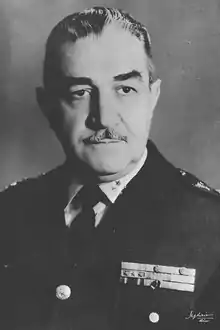Márcio Melo
Márcio de Sousa e Melo (26 May 1906 – 31 January 1991[1]) was a general with the Brazilian Air Force. Melo was one of the military in the joint military board that ruled Brazil between the illness of Artur da Costa e Silva in August 1969 and the investiture ceremony of Emílio Garrastazu Médici in October of that same year.
Márcio Melo | |
|---|---|
 | |
| Member of the Brazilian Military Junta | |
| In office 31 August 1969 – 30 October 1969 | |
| Preceded by | Artur da Costa e Silva (as President) |
| Succeeded by | Emílio Garrastazu Médici (as President) |
| Minister of Aeronautics | |
| In office 15 March 1967 – 29 November 1971 | |
| President | Artur da Costa e Silva Military Junta (interim) Emílio Garrastazu Médici |
| Preceded by | Eduardo Gomes |
| Succeeded by | Joelmir Campos de Araripe Macedo |
| In office 15 December 1964 – 11 January 1965 | |
| President | Castelo Branco |
| Preceded by | Nelson Freire Lavanère-Wanderley |
| Succeeded by | Eduardo Gomes |
| Personal details | |
| Born | Márcio de Sousa Melo 26 May 1906 Florianópolis, Santa Catarina, Brazil |
| Died | 31 January 1991 (aged 84) Rio de Janeiro, Rio de Janeiro, Brazil |
| Spouse | Zilda Andrade |
| Children | 2 |
| Parent(s) | Francisco Agostinho de Sousa (father) Maria dos Anjos Malheiros (mother) |
| Military service | |
| Allegiance | |
| Branch/service | |
| Rank | |
| Commands |
|
| Battles/wars | |
| Awards | • • |
During the government of the junta, the American Ambassador to Brazil Charles Burke Elbrick was kidnapped by the communist guerilla group Revolutionary Movement 8th October — radical opposition to the military dictatorship.
This article is issued from Wikipedia. The text is licensed under Creative Commons - Attribution - Sharealike. Additional terms may apply for the media files.
